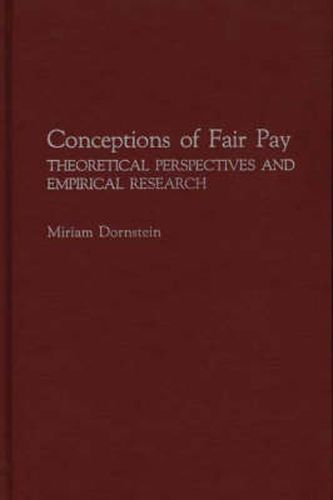Readings Newsletter
Become a Readings Member to make your shopping experience even easier.
Sign in or sign up for free!
You’re not far away from qualifying for FREE standard shipping within Australia
You’ve qualified for FREE standard shipping within Australia
The cart is loading…






Organizational behaviour theorists as well as compensation theorists agree that an understanding of the subjective pay fairness perceptions of employees is essential, but the fragmentation of recent research on the subject has made the topic difficult to approach. In this work, Miriam Dornstein attempts to alleviate the problem by providing a systematic and extensive review of writings that are specifically relevant to pay fairness evaluations, rather than to subjective justice in general. Her integrative approach examines the implications and applications of the entire spectrum of empirical research, taking into consideration scholars not only of different disciplines but of varying geographic areas. The four-part structure of Dornstein’s work leads the reader gradually to the subject. Part 1 begins the book with a schematic review of the sources of recent interest in pay fairness, while Part 2 provides an extensive review of relevant theories, their critiques, and major controversies. An outline of the important questions confronting empirical research and arising from the detailed theories is also provided, and leads into Part 3, an up-to-date survey of the empirical research that relates to these questions. The final section summarizes and evaluates the empirical findings in relation to the questions posed in Part 2, and concludes with a look at their implications for wage administration and policy.
$9.00 standard shipping within Australia
FREE standard shipping within Australia for orders over $100.00
Express & International shipping calculated at checkout
Organizational behaviour theorists as well as compensation theorists agree that an understanding of the subjective pay fairness perceptions of employees is essential, but the fragmentation of recent research on the subject has made the topic difficult to approach. In this work, Miriam Dornstein attempts to alleviate the problem by providing a systematic and extensive review of writings that are specifically relevant to pay fairness evaluations, rather than to subjective justice in general. Her integrative approach examines the implications and applications of the entire spectrum of empirical research, taking into consideration scholars not only of different disciplines but of varying geographic areas. The four-part structure of Dornstein’s work leads the reader gradually to the subject. Part 1 begins the book with a schematic review of the sources of recent interest in pay fairness, while Part 2 provides an extensive review of relevant theories, their critiques, and major controversies. An outline of the important questions confronting empirical research and arising from the detailed theories is also provided, and leads into Part 3, an up-to-date survey of the empirical research that relates to these questions. The final section summarizes and evaluates the empirical findings in relation to the questions posed in Part 2, and concludes with a look at their implications for wage administration and policy.